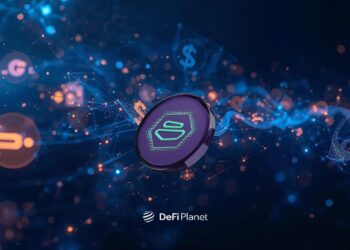The tentacles of blockchain technology have found their way into different facets of our lives. More people are incorporating blockchain technology into their daily activities because of its elements such as decentralization, immutability, transparency, etc.
Blockchain technology is being incorporated into the architecture of fintech for various reasons, some of which will be examined in this article. This technology allows users to easily access the different activities that fintech offers.
This article extensively explores the aspects of everyday life that blockchain is transforming.
What is Fintech?
Fintech is an abbreviation for financial technology and refers to any form of technological innovation that changes how people do business. It could involve lending, insurance, saving, trading, and other activities.
With the advent of the internet, the concept of fintech has grown immensely. Fintech is trying to circumvent traditional banking facilities’ bottlenecks, improving customer experience.
The Evolution of Fintech?
The financial sector is one of the industries that has embraced technology, implementing innovative features in real-time.
There have been different eras of fintech development throughout history. The first era began in 1886 and lasted until 1967. During this period, cross-border financial information transmission was born.
The first transatlantic cable and Fedwire in the United States, established in 1866 and 1918, were significant events that underlined the first era of fintech development during this period.
Credit cards had been introduced into society by the time the 1950s arrived. The Diner’s Club issued the first credit card. The American Express Card, used by millions of people today, was introduced in 1958.
In the second era, Fintech 2.0, the financial industry witnessed an influx of teeming banks of different types. The financial system transitioned from an analog to a digital concept. In 1967, Barclays bank built its first ATM, ushering in this convenient method of accessing fiat currency.
The first digital stock exchange, NASDAQ, was established in the 1970s. In recent times, this stock exchange has grown to be one of the largest in the world. The financial landscape has expanded due to the implementation of this financial system.
SWIFT (Society for Worldwide Interbank Financial Telecommunications) was also developed during this period. Banks use this financial architecture to connect globally, regardless of location. The SWIFT architecture is used to process a large number of payments all around the world.
This phase also witnessed the advent of online banking, allowing customers to conduct transactions without needing to physically visit banking halls. This was made possible with the rise of the internet.
The third era, or Fintech 3.0, focuses on startups. These startups are revolutionizing financial technology by eliminating the need for individuals to use banking facilities for monetary transactions.
This era heralded the arrival of new participants in fintech, such as startups and cryptocurrencies. In 2009, Bitcoin, the first cryptocurrency, was launched, forever changing the face of finance as we know it. With the emergence of bitcoin, a functioning blockchain was created, transforming how people send money, manage their funds, and handle their finances.
Blockchain technology has accelerated the growth of decentralized finance, an alternative form of finance.
What is Decentralized Finance?
This is a new offshoot of finance that is based on blockchain and it incorporates decentralization, transparency, immutability, and much more that are unseen in traditional finance. DeFi is a way that blockchain is changing the Fintech ecosystem. It may come in the form of insurance, payment, oracle system, revenue-earning, and much more.
Different types of DeFi platforms
DeFi is one example of how blockchain is transforming the fintech ecosystem. This blockchain-based finance offshoot integrates decentralization, transparency, immutability, and other features not seen in traditional banking. It could entail insurance, payment, an oracle system, revenue-generating, or anything else.
Decentralized Insurance
DeFi insurance involves obtaining insurance coverage against losses in the decentralized finance space for oneself or a DeFi protocol.
Users whose assets are locked to a DeFi protocol, such as an Automated Market Maker, may lose their crypto holdings if the platform is compromised. Individuals can choose to insure their funds against hacking-related losses, or the DeFi protocol can subscribe to the coverage, protecting its users from the risks associated with cyberattacks.
Decentralized Lending
A crypto lending service may take the form of a Decentralized Finance lending platform, which requires borrowers to always ensure that their collateral amount is above a particular threshold to avoid liquidation. If borrowers want to access their collateral, they must pay the loan and the interest. The over-collateralization model is prevalent in DeFi lending services.
Automated Market Maker
An AMM is a decentralized exchange that exchanges tokens through liquidity pools. Peer-to-peer (P2P) exchange is an example of a decentralized exchange. Decentralized exchanges frequently experience liquidity issues when swapping tokens. A potential buyer, for example, must wait for a potential seller to place an order before the swap can take place on a peer-to-peer (P2P) decentralized exchange. This could take some time, undermining the objective of instant token exchange.
Decentralized Oracle System
Accurate information is critical for any blockchain platform, especially those governed by smart contracts.
Goracle features a decentralized oracle architecture that provides different smart contracts with access to accurate and relevant data. The chosen data feeds will come from both within and outside the network.
Decentralized platforms can customize their data feeds to include information on events occurring outside of the blockchain space, such as the weather, and events happening in real-time within the blockchain space, such as crypto prices.
How Blockchain is revolutionizing Fintech.
Blockchain is changing the state of Fintech in different areas that will be disclosed below.
Blockchain is transforming the state of Fintech in various ways, which will be discussed further below.
Democratizing Money Management
Fintech companies are revolutionary, with some aiming to improve payment processing, investment, lending, and insurance, among other things. Many focus on money management in ways that are distinct from what traditional banks do. This is consistent with blockchain technology, particularly cryptocurrencies. Cryptocurrencies are digital currencies that people can hold without needing the services of a bank. Most fintech companies are interested in banking the unbanked and offering customers more flexible money management facilities without the rigid structure seen in traditional banks.
Fintech companies strive to give users more flexibility, which cryptocurrencies already do. Crypto holders manage their funds and can determine how to spend, trade, and manage them.
Some Fintech companies have taken it upon themselves to provide crypto-related services to their clients while also giving them the freedom and chance to manage their holdings, even in the event that they lose their private keys.
Reduced transaction cost
Traditionally, sending money from one part of the world to another can be expensive. The cost could be up to 10% of the amount sent. This tends to increase if it is a cross-border transaction. The transaction fees are reduced drastically if the same individual opts to send money via blockchain using cryptocurrencies.
When fintech companies incorporate blockchain into their technology, they get a competitive advantage by offering lower transaction rates than their competitors.
Traditional payment channels may charge higher transaction fees because of the infrastructure that underpins their operation.
Smart contract
A smart contract is a self-sustaining protocol that uses computer code to automate transactions.
The developer adds the smart contract’s rules, and the smart contract is triggered when the event occurs.
It is automated, which means that it is triggered automatically.
For example, if an insurance firm creates a smart contract that pays out if an event occurs, and the event occurs, the individual who purchased the insurance is immediately compensated.
This is a valuable technology for finance organizations looking to become more decentralized and automated.
In Conclusion,
- Fintech is an abbreviation for financial technology and refers to any innovation that impacts how people do business.
- A crypto lending service might take the shape of a decentralized finance lending platform that requires borrowers to keep their collateral amount above a particular threshold to avoid liquidation.
- Smart contracts enable fintech companies to automate their operations, resulting in cheaper operational and transaction costs.
- Blockchain technology has altered the status quo and is revolutionizing the finance industry.
If you would like to read more articles like this, visit DeFi Planet and follow us on Twitter, LinkedIn, Facebook, and Instagram.
“Take control of your crypto portfolio with MARKETS PRO, DeFi Planet’s suite of analytics tools”





















